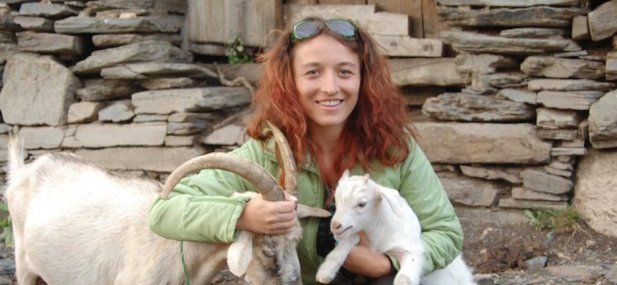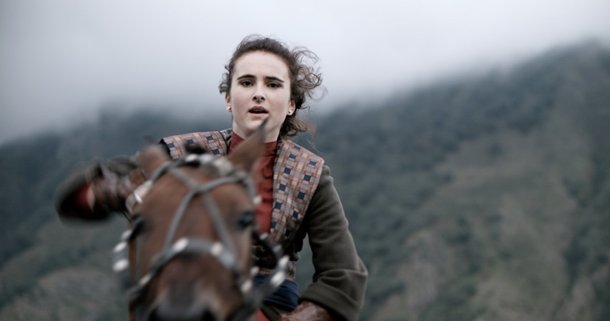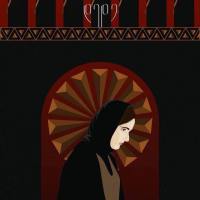Dede: A Film From Georgia

The final moments in Mariam Khatchvani’s film Dede.
Svaneti is a province in Georgia in the Greater Caucasus Mountains with the highest permanently inhabited village in Europe; Ushguli at 2,100 meters (6,900 ft). It is buried in snow about six months of the year. Until recently the roads were so fierce and unpredictable that the village remained essentially in the Middle Ages culturally. The roads are still quite dangerous. And so Ushguli has preserved strange towers that make it look like something Tolkien forgot to describe in Middle Earth. Improved roads now take visitors up the mountain sides today, mountain roads festooned with crosses for the dead who drove off the path. But as recently as the 1990’s not only Ushguli but much of Svaneti was living in a tribal past. Soviet Communism never penetrated too far. Even the Georgian Orthodox Church found its beliefs with mingled with animal sacrifices of a not too distance pagan past.

An alternative poster for Dede.
Mariam Khatchvani’s film Dede (pronounced day-day), which opened in Tbilisi Georgia in February 2017, after being featured at the Karlovy Vary Film Festival, among others, is set in the near feudal world of Svaneti in the 1990’s. And you’ll have to remind yourself of that when you watch it. Filmed in Ushguli and other Svaneti locations it has the feel of authenticity that comes from a filmmaker knowing exactly what she is seeing. Khatchvani in a Svan herself and tells a story partly based on the stories her own grandmother told her. And in case you were thinking that the tribal past sounded like a romantic place to visit Khatchvani is sure to make you rethink that notion. In an earlier short film, Dinola, also based on her grandmother’s stories, and some of the harsher Svan traditions, a woman who loses her husband must marry the first man who then proposes. And leave her child with her late husbands family. Dinola is almost told from the child’s perspective.

Director Mariam Khatchvani with a couple of her untrained actors.
Dede is the full perspective of the mother. It is a slightly different setting but recognizably the same basic story. But now it is much more complex. With three men and one woman and their relationship to her. But again the issue of child loss through tradition comes to the fore. Without going too deeply into the subtle and intense plot twists, which need to be seen without any advance knowledge, we can say that the issues with the child eventually recreate a winter trek through the deep snow directly based upon Khatchvani’s grandmother’s story.

Giorgi Babluani and Natia Vibliani in Dede.

Horseback ride filmed in Kazbegi.
The film is beautifully shot in Svaneti by Konstantin Esadze, which gives it far more production value than any Hollywood special effects could possibly match. Everything is real, because Svaneti, though now more accessible, is still there. Khatchvani uses stillness. She is unafraid to study the faces, the behavior of her characters. Giorgi Babluani is the only professional actor in the film. For anyone who has ever seen the original French/Georgian film 13 Tsameti he is the central figure in that extremely dark film. All of the other actors in Dede, as in Dinola, were Svan amateurs. And that is hard to believe. Especially in the central performance of Dina by Natia Vibliani. Natia plays the role with such conviction and honesty that I was surprised to find that she was not an actor at all. In two moments of emotional connection she conveys beautifully the depth of human longing and tenderness.
Now this is the part of my story that would be hard to replicate anywhere but Georgia. And why I am reviewing this film for you. I was in Tbilisi. I also have many Georgian Facebook connections. So I was curious as to whether Natia had a Facebook page. Why yes. She did. And so I wrote to her. And lo and behold within a few weeks we were sitting down in a cafe in the Saburtalo area, not too far from my apartment, for an interview. One thing I have come to understand about Georgians is that there is almost a innate curiosity about people and things. And so after a bit of communication back and forth we eventually found time to meet. And the reason it took a while, apart from the fact that she had to come back from an Egyptian film festival, is because her job keeps her quite busy. Natia she is a policewoman! She had studied law at university and was now doing security duty at the airport. This really made me laugh. One minute I’m watching her on a screen. Then I’m getting in touch with her. And she’s with the police. Only in Georgia!
We had a friendly and natural discussion, she in no way has let her film experience affect her. One thing that was important for me was to clarify parts of the film I may have misunderstood since there were no subtitles. Yes the film was about a woman whose child was taken from her due to ancient tribal codes. One character dies in a mountain car crash off screen. She was taken to another village to live while her son had to be left behind. We then entered the meat of the interview. (Which can be viewed below.) Why she was chosen to play the role. How she portrayed her character. How she felt working with professional actor Giorgi Babluani. Eventually we simply talked about ideas and places. I shared a few Alaskan stories and images. Natia had very recently gotten married. She wanted to take on more serious policing responsibilities and yet the idea of being in another film was also intriguing to her. One thing that was clear to me was that no matter what else happens to her Natia would always look at this time of her life as a unique moment.
While Dede has been shown in a few festivals it has not arrived in any English speaking countries yet. But I know one day it will. Mariam Khatchvani has made a very special and personal film well worth seeking out on disc or download someday. I would not have sought out Natia had the film not been excellent. My only small criticism of the film was that I would have wished that the scene where Natia’s character Dina had to walk through the snow to get back to her child had been more developed. But this is really a minor flaw. It was an excellent and heartfelt first feature film.

Mother and Son in Dede.
In an earlier essay I lamented the lack of mature films in our times. I mentioned the glut of comic book heroes and science fiction fantasy culture that surrounds us today. And many of these symptoms of cultural sterility can be found in Georgia as well. But not being made by Georgians. Dede is the kind of film we need in such hollow times. A film of honesty and reality set in a specific time in a specific place.

Meeting Natia Vibliani at the Four Seasons Café.
დიდი მადლობა ნათია ვიბლიანისა და მარიამ ხაჩვანისთვის მისი ფილმისთვის.
More Georgian stories are coming!
Byrne Power
Haines, Alaska
4/21/2018
Thanks to our PayPal supporters. Without you our journey would have collapsed. You too can help out with this documentary project. It’s easy and simple. Just follow this link:
Donate Through PayPal Here!!








Pingback: Gravity From Above: A Personal Reckoning | GRAVITY FROM ABOVE